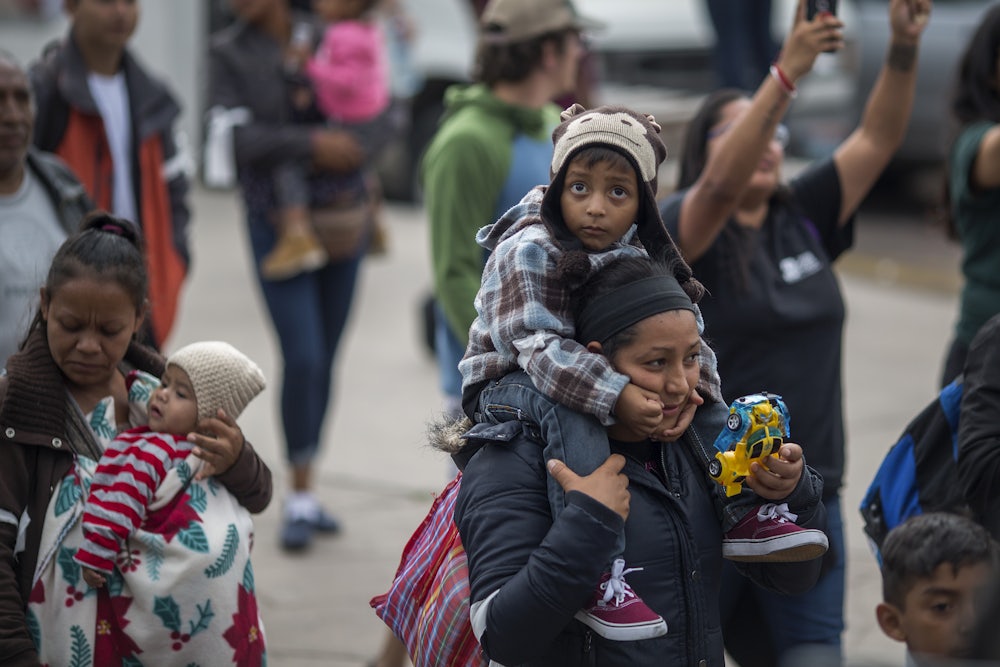After a grueling, monthlong journey through Mexico, the first eight women and children from a caravan of several hundred Central American migrants were allowed to enter a U.S. immigration post on Monday night. There, they’ll apply for asylum and a chance to enter the country with legal status, after escaping gang violence and other threats in their native country. In many ways, however, their journey is just beginning.
U.S. immigration law allows non-citizens who reach American soil to apply for asylum, a right guaranteed by both international law and acts of Congress. That right—and the spirit of compassion and openness that drives it—isn’t without its detractors. The Trump administration has gone to extraordinary length to denigrate the most recent group of migrants to reach the United States, as well as immigrants and asylum-seekers in general.
In twin statements last week, the Justice Department and the Department of Homeland Security gave stern warnings to the caravan as it approached the U.S. border. “Let today’s message be clear: our nation has the most generous immigration system in the world, but this is a deliberate attempt to undermine our laws and overwhelm our system,” said Attorney General Jeff Sessions. “A sovereign nation that cannot—or worse, chooses not—to defend its borders will soon cease to be a sovereign nation,” added Homeland Security Secretary Kirstjen Nielsen.
After the caravan arrived on Monday, administration officials put their words into practice: The Justice Department announced criminal charges for illegal entry against eleven people it claimed were linked to the caravan. “The United States will not stand by as our immigration laws are ignored and our nation’s safety is jeopardized,” Sessions said. The department’s documents don’t indicate how it knew the detained migrants were linked to the caravan.
Hostility towards potential asylum seekers flows from the top. President Donald Trump last month erupted on Twitter over the caravan, claiming that the Mexican government did nothing to stop the flow of migrants towards the U.S. border. “They laugh at our dumb immigration laws,” he wrote. “They must stop the big drug and people flows, or I will stop their cash cow, NAFTA. NEED WALL!” On Monday evening, he returned to the subject:
The migrant ‘caravan’ that is openly defying our border shows how weak & ineffective U.S. immigration laws are. Yet Democrats like Jon Tester continue to support the open borders agenda – Tester even voted to protect Sanctuary Cities. We need lawmakers who will put America First.
— Donald J. Trump (@realDonaldTrump) April 30, 2018
Overseeing the journey is a volunteer organization called Pueblos Sin Fronteras (People Without Borders). The group helps migrants travel out of Central American countries that are experiencing high levels of violence and civil strife. BuzzFeed News reporter Adolfo Flores, who shadowed the convoy’s journey through Mexico, estimated that at one point last month more than 1,000 people were part of it, and that about 80 percent of them were Honduran:
Twenty-nine-year-old Mateo Juan said the caravan was his third attempt at getting to the United States. Seven months ago, Mexican immigration officers pulled him off the bus. The same happened about a month ago.
He heard about the caravan in March when he arrived in Tapachula, the caravan’s starting point.
“Going alone is risky. You’re risking an accident, getting jumped by robbers, and even your life,” he told BuzzFeed News. “All of that, and then you don’t get to the United States. The caravan is slower but you know you’re going to get there safely.”
To successfully claim the status, applicants must demonstrate that they have a fear of persecution if they are sent back to their native country. What meets that threshold can be a complicated question. Histories of persecution against people of certain races, ethnicity, religious faiths, and political beliefs can be used as evidence when applying for asylum. So can personal experiences of mistreatment at the hands of a powerful private actor or a foreign government itself.
But other misfortunes may not qualify. High rates of lawlessness and crime, which is rampant in Honduras and El Salvador, don’t guarantee acceptance; instead, the claim often has to be linked to a more sinister motive than ordinary criminal activity. Asylum-seekers must also have clean criminal records and no record of participation in internal armed conflicts. That last point can sometimes make it harder to process claims when applicants come from countries with civil wars or high levels of ethnic strife.
The discretion that Congress has given to the executive branch adds another hurdle for asylum seekers. Federal laws hand immense power over the immigration court system to the attorney general—in this case Jeff Sessions, an avowed foe of undocumented immigrants and an opponent of legal immigration. And he’s begun to wield that power.
In early March, Sessions reversed a 2014 decision by the Board of Immigration Appeals that gave asylum seekers the right to seek a full hearing from an immigration judge. The Washington Post reported that those judges will now be able to dismiss asylum claims after a cursory review, without an adversarial hearing. Later that month, The Wall Street Journal reported that Sessions might revoke the right to claim asylum for women fleeing domestic violence.
The attorney general’s moves comport with a broader theme of U.S. immigration policy in the Trump era: using its broad discretion to sharply limit flows of legal immigration into the United States. The Trump administration has stripped temporary legal status from 200,000 El Salvadorans and other groups of foreign nationals, imposed a widely criticized travel ban against mostly Muslim-majority countries, and shuttered the DACA program for undocumented immigrants who were brought to the U.S. as children.
This doesn’t mean that some caravan members won’t successfully claim asylum. But it underscores the challenges they still face after their arduous trek.
